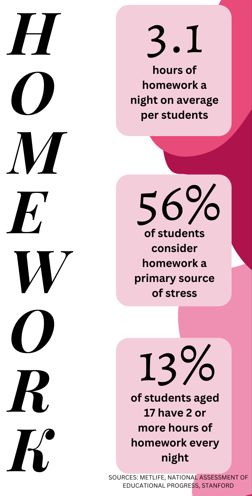Day-to-day Homework Fails
November 1, 2022
Swamped with homework and riddled with stress, high schoolers return exhausted to their houses to go to any number of extracurriculars and then tackle the feeling of dread when looking at their pile of homework. Even when that work gets done, it is often deep into the night or early morning. The standard reaction from most teachers is to push through, and ignore time. But not for some.
“I tell kids if they have to choose between sleeping and finishing my assignments, to choose to sleep – without this, the next day in school will be unproductive and a waste if they are sleeping through all their classes,” AP Seminar and AP World History teacher Jodi Best said via email.
Best has a unique policy. Her class has no points taken off for work that is turned in late because the learning is self paced. “Everything I have kids complete in my class furthers their understanding and learning. If I am asking them to complete it then it is significant to the learning process and they know this,” Best said.
In allowing students to take time to learn content rather than mindlessly complete assignments on short deadlines, they are better prepared for tests and quizzes, making their work time worthwhile.
However, not all students are motivated the same. Math teacher Natalie Reyes differentiates homework policies based on class level. “For accelerated Algebra One, they’re brand new to high school, so I wanted to give them more study habits,” she said. But for her honors class, she expects a higher level of accountability. “I give them a little bit more flexibility with their nightly workload. So if they had a game, or if they had a huge paper to write for a particular class, they could prioritize that because I know that they will definitely get it done prior to the due date.”
Both of these teachers understand that busy work is so common, that it’s hard to avoid, and even harder to finish because of its lack of meaning.
According to a study published in the Journal of Experimental Education, most high school aged students do an average of three hours of homework per night. This excessive amount of time spent on schoolwork prevents kids from indulging in hobbies, or practicing sports, or doing any number of extracurriculars required to get into dream colleges.
The National Education Association and National PTA support the idea of a 10 minute homework guideline. This concept explains that for every grade, 10 minutes should be added to the homework load, starting with first grade. For second graders, this means 20 minutes a night. But for 11th graders, that’s nearing two hours.
For context, the average workout at a gym is 45 minutes. The average time it takes to read 30 pages of a book is an hour. These other necessities in a student’s life, like painting, writing, hiking, being with family, baking, take up deserved time, but can not be prioritized because of extreme homework deadlines.
It would be naïve to say that a general rule should be applied to the entire school when it comes to a homework policy. The solution depends on the subject.
For history and English classes, assign homework for the end of a unit or a quarter, rather than every night. For Math and Science classes, have weekly quizzes when homework is due, or have the due dates for larger assignments be the same for the homework needed to understand the content.
In allowing students to be independent with their study methods, and experiment with what works for them, they will become better prepared for their future, which is entirely what high school and homework are about.






















